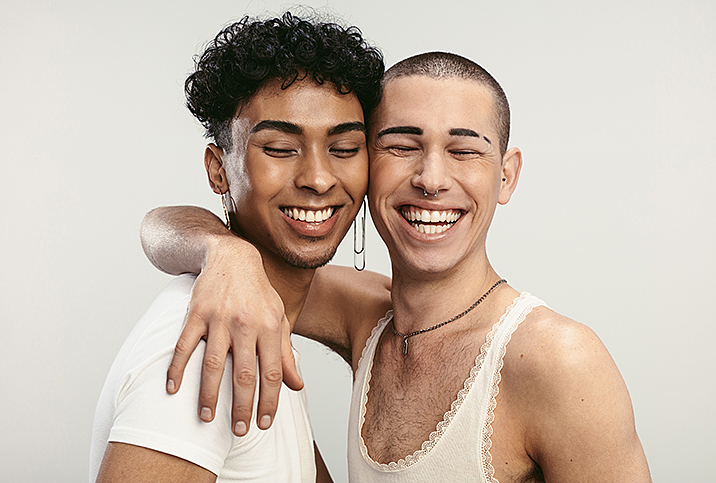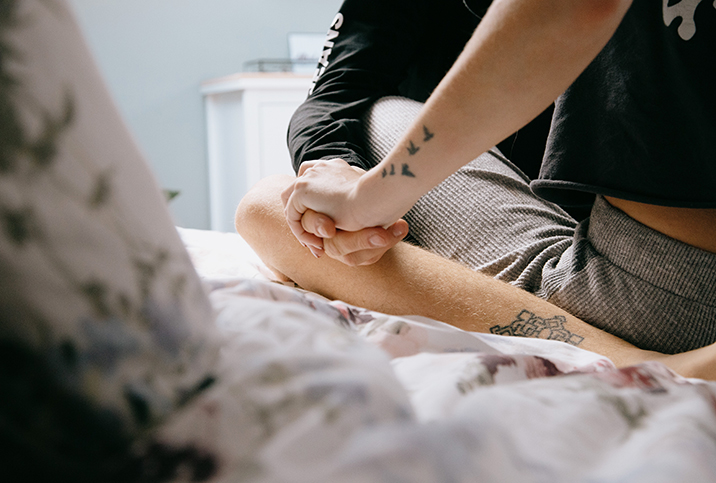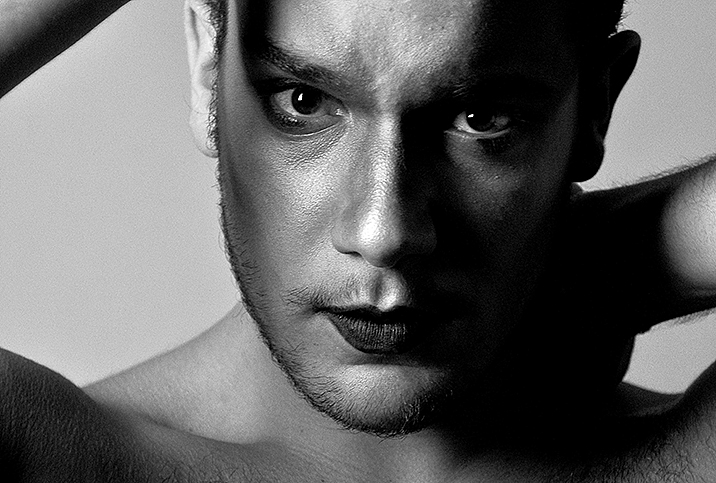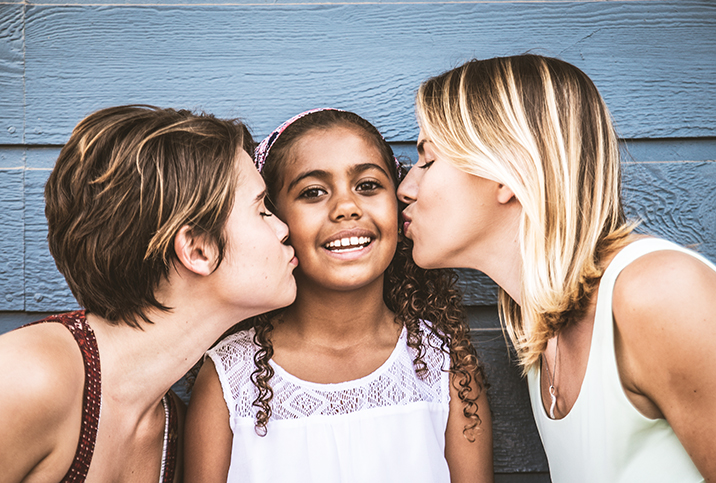I'm Transgender. Is That Something I Inherited?

Transphobia takes many forms, from internet bullying to blatant and horrific violence. One particularly insidious channel it moves through is in discussing the origins of the phenomenon. Some say transgender people originated from nothing but simple social conditioning. Others say being trans has to do with hormonal imbalances, both pre- and postpartum. Others have still more unkind theories: that trans people are lying entirely. Bottom line, there's no clear answer as to why a trans person is trans.
I am of the mind that there is no absolute answer that applies to everyone. I believe the transgender experience is widely varied, just as the way people choose to transition is varied as well. It could very well be a hormone imbalance, it could be social conditioning, but it could also be neither of these things.
I often don't feel comfortable sharing a lot of my experiences with being transgender—even with other transgender people. In part that's because some of my experiences may feed into stereotypes a lot of trans people (trans women especially) are trying to break away from. It's easier to remain self-assured of my own knowledge and leave the world in the dark.
However, for related reasons, and for a long time, I struggled with a severe case of imposter syndrome, where you begin to doubt yourself. Of course, that's common in the LGBTQIA+ community, but my fears were rooted a little differently.
An unknown past, made known
In August of 1995, I was born to my 17-year-old and recently single mother. I was then given to my adoptive family and blessed with a mostly caring, supportive, fulfilling life, one my biological mother wouldn't have been able to provide.
I was told from a very young age about my adoption and what it meant. I can recall a picture book I was given that explained adoption. The text reminded the reader that adoption did not mean your parents did not love you or you were unwanted, but rather you were loved so much, your mom and dad were willing to sacrifice their own feelings to ensure you were given the best life possible.
Even so, per the terms of my closed adoption, I wasn't allowed to have contact with my birth parents until I was 18—and they had to be the ones to initiate the contact. I was not allowed to have any identifying info about them, not even a last name. With so many restraints in place, I never bothered thinking about it as I grew up.
Even after I turned 18, I wasn't keen on breaking the rules. I foolishly assumed my adoption was my parents' first-class ticket to moving on with their lives as individuals. I was (and technically still am) the only evidence of their relationship. They are good friends now, but according to my mother, the breakup was rather…emotionally involved.
A few weeks after I turned 19, I received a letter in the mail from my biological father.
He found me on Instagram. Totally "CSI"-style, he used a photo I'd taken in my front yard and found it in Google Maps to track down my address.
When I heard the news, I suddenly felt a deep-rooted resentment I didn't know I had. It was a damned-if-you-do type of situation, as I'm sure I would have likely felt the same resentment if I'd never received any contact at all. Luckily enough, my adoptive parents did a wonderful job of ensuring I was well-rounded, and so I was able to process my emotions in a healthy way.
After some time thinking about it, I decided to write back.
After returning from school one day, my mom told me another letter had come for me from my father. The way she said it, though, made me slightly uneasy as she spoke as if he wasn't actually my father at all. My mind began to race and panic began to grow—if he wasn't my father, then who was he? Why would somebody even go through all of this just to play a sick joke?
The letter waiting for me had the answers.
Like mother…
As it turns out, my father was not my father after all. A couple of years after I was born, she had begun transitioning and was now out on the other side, having completed her transition about four years previously. She was living her life in one of the most progressive cities in the country and had even begun living stealth, meaning those around her had no indication she was anything other than a cisgender woman.
My mom looked at me with eager eyes and asked me what I was going to do. I wasn't even sure until I realized the answer: I didn't have to do anything.
I didn't need to know the entire story of how she became who she was just to respect her. Not every story needs to be fully fleshed out and documented for it to be good, let alone valid.
But I did learn her story. She was an open book about her entire journey, but I could sense there were many times she wanted to say more, but couldn't bring herself to do it. She either hadn't fought those demons yet or she lost the battle with them long ago. Her sharing her experiences of being a trans woman in the early 2000s showed me that while the world has definitely come a long way, our progress is nothing compared to how far we have to go.
I didn't need to know the entire story of how she became who she was just to respect her.
There was no fight for visibility or fair representation in the media when she began her journey. She was more than happy when she lost her job after coming out and was kicked out of her parents' home at 19. Even if those around her had been supportive, they might still have been a safety concern: People who know you before your transition are always at risk of slipping up and calling you by the wrong name or pronouns, because they spent years doing it. Being outed like that isn't just embarrassing, it can be life-threatening.
The way in which she discussed transitioning was—clearly—not going to sway anybody into trying it. She lived in her car for more than a year and a half, underwent multiple surgeries and dealt with all of it without anybody supporting her. There was no way I could want to do that.
But it was admirable. Knowing I had that in my DNA made me confident in tackling whatever came my way, but the thing is, I had no idea just what was coming my way.
…like daughter?
At this stage in the game, I was not yet considering the idea of being transgender myself. While I was accepting of everybody, I felt as if my experiences with gender identity were far removed. I may have played with the idea of being a woman a few times throughout my life, but it was much more of a "play pretend" kind of deal or just impossible hypotheticals: "I wouldn't mind being a woman, but only if…"
I can already sense all the rabid TERFs foaming at the mouth, completely and entirely ready to label me an imposter, or, worse yet, a sheep. Trans-ness is often perceived as a learned behavior. I was aware of this from the very beginning. I'm very aware of the "monkey see, monkey do" phenomenon. I know sometimes people in their formative years will copy mannerisms and ideas they absorb from the world around them. In fact, I was 21 years old when I made the initial jump to transition but I did think it out beforehand, and before you even try to ask about my T-mom's (she agreed to the name) opinion, here's the kicker…
She doesn't even know about any of this.
For reasons not important here, she and I no longer speak, and I never told her about my realization.
While she did not govern my gender identity, she is the only link I can form to being transgender. She didn't make transitioning sound "fun," and she wasn't even present for the first 19 years of my life. Furthermore, we didn't speak in the years between then and my turning 21.
Coincidence? Maybe, but I don't know. I'm not the one to solve this mystery for everyone, but, then again, perhaps it's a mystery that doesn't require a solution.



















Commentary